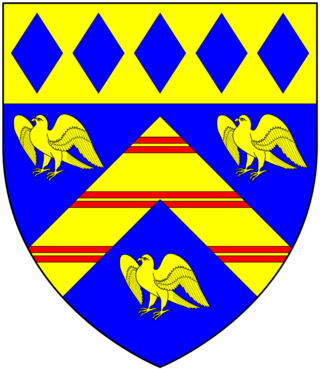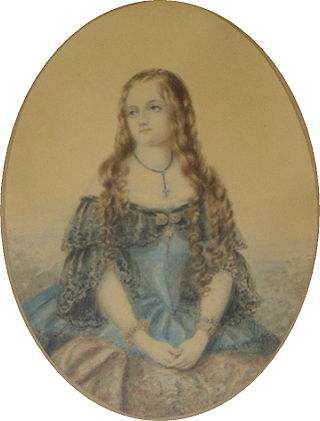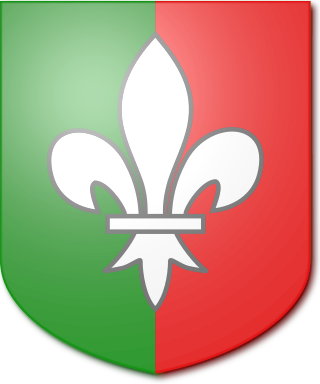
Baron Roborough, of Maristow in the County of Devon, is a title in the Peerage of the United Kingdom. It was created on 24 January 1938 for Sir Henry Lopes, 4th Baronet. He had earlier represented Grantham, Lincolnshire, in Parliament as a Conservative. The Baronetcy, of Maristow House in the County of Devon, had been created in the Baronetage of the United Kingdom on 1 November 1805 for Manasseh Masseh Lopes, a member of a wealthy family of Portuguese Jewish origin, with special remainder to his nephew Ralph Franco, son of his sister Maria. Manasseh Masseh Lopes converted to Christianity in 1802, and later represented Evesham, in Worcestershire, Barnstaple in Devon, and Westbury in Somerset, in Parliament. However, in 1819 he was twice convicted of bribing the voters in both Barnstaple and Grampound in order to be elected to Parliament, and was sentenced to imprisonment and heavy fines. He was also unseated by the House of Commons, but after his release from prison he nonetheless got elected for Westbury, a pocket borough which he controlled to a great extent.
The Adair Baronetcy, of Flixton Hall in the County of Suffolk, was a title in the Baronetage of the United Kingdom. It was created on 2 August 1838 for Robert Adair. He was succeeded by his eldest son, the second Baronet. He sat as Member of Parliament for Cambridge. In 1873 he was created Baron Waveney, of South Elmham in the County of Suffolk, in the Peerage of the United Kingdom. The barony became extinct on his death in 1886 while he was succeeded in the baronetcy by his younger brother, Hugh Adair, the third Baronet. The latter had earlier represented Ipswich in Parliament. Two of his sons, the fourth and fifth Baronets, both succeeded in the title. The fifth Baronet's son, the sixth Baronet, was a major general in the British Army. The title became extinct on the latter's death in 1988.

The Bagge Baronetcy, of Stradsett Hall in the County of Norfolk, is a title in the Baronetage of the United Kingdom. It was created on 13 April 1867 for William Bagge, Conservative Member of Parliament for West Norfolk. The sixth Baronet was Chairman of the West Norfolk District Council between 1976 and 1977.

The Ogle baronetcy, of Worthy, was a title in the Baronetage of the United Kingdom. It was created on 12 March 1816 for Admiral Chaloner Ogle, of Kings Worthy, Hampshire.

There has been one creation of a baronetcy with the surname Dering.

The Peek Baronetcy, of Rousdon in the County of Devon, is a title in the Baronetage of the United Kingdom. It was created on 13 May 1874 for Henry Peek. He was an importer of spices, tea and other groceries, a philanthropist and Conservative Member of Parliament for Surrey Mid. The second Baronet was an astronomer and meteorologist; the third Baronet was high sheriff of Devon in 1912.

The Price, later Rugge-Price Baronetcy, of Spring Grove in Richmond in the County of Surrey, is a title in the Baronetage of the United Kingdom. It was created on 2 February 1804 for Charles Price, Member of Parliament for the City of London from 1802 to 1812 and Lord Mayor of London from 1802 to 1803. The fifth Baronet assumed in 1874 by Royal licence the additional surname of Rugge. As of 28 February 2014 the present Baronet has not successfully proven his succession and is therefore not on the Official Roll of the Baronetage, with the baronetcy considered dormant since 2000.

The Wraxall Baronetcy, of Wraxall in the County of Somerset, is a title in the Baronetage of the United Kingdom. It was created on 21 December 1813 for Nathaniel Wraxall. He was in the East India Company Civil Service, an author and member of parliament for Hindon, Ludgershall and Wallingford. His grandson, the third Baronet, was an author.

The Stracey baronetcy, of Rackheath in the county of Norfolk, is a title in the baronetage of the United Kingdom. It was created on 15 December 1818 for Edward Stracey. He was the eldest surviving son of Sir John Stracey, chief judge of the Sheriff's Court and a recorder of London.

The Brocklehurst Baronetcy, of Swythamley Park, in the parish of Rushton, in the County of Stafford and of Stanhope Terrace, Hyde Park, in the County of London, was a title in the Baronetage of the United Kingdom. It was created on 27 August 1903 for Philip Lancaster Brocklehurst. He was the youngest son of John Brocklehurst, a silk weaver and Member of Parliament for Macclesfield, the younger brother of William Coare Brocklehurst, also Member of Parliament for Macclesfield, and the uncle of John Brocklehurst, 1st Baron Ranksborough.

The ffolkes Baronetcy, of Hillington in the County of Norfolk, is a title in the Baronetage of Great Britain. It was created on 26 May 1774 for Martin ffolkes, FRS later High Sheriff of Norfolk and Member of Parliament for King's Lynn. The second Baronet represented Norfolk and Norfolk West in the House of Commons while the third Baronet represented King's Lynn. The fifth Baronet was Honorary Chaplain to Queen Victoria, Chaplain-in-Ordinary to Edward VII and George V and Chaplain to Edward VIII and George VI.

The Parkyns Baronetcy, of Bunny Park in Nottinghamshire, is a title in the Baronetage of England. It was created on 18 May 1681 for Thomas Parkyns in acknowledgement of the royalist service of his father Colonel Isham Parkyns during the English Civil War.

Sir Henry Jacob Preston, 3rd Baronet was an English soldier, magistrate and footballer. He represented England in the second representative football match against Scotland in November 1870.

The Astley Baronetcy, of Hillmorton in the County of Warwick, was created in the Baronetage of England on 25 June 1660 for Jacob Astley, nephew of the first Baronet of Melton Constable. For more information on this creation, see Baron Hastings.

The Smith baronetcy of Stratford Place in London was created on 6 September 1897 in the Baronetage of the United Kingdom for the surgeon Thomas Smith, on the occasion of the Diamond Jubilee of Queen Victoria, to whom he was surgeon extraordinary.

The Blackwood baronetcy, of the Navy, was created in the Baronetage of the United Kingdom on 1 September 1814 for the Honourable Henry Blackwood, seventh son of Sir John Blackwood, 2nd Baronet and of Dorcas Blackwood, 1st Baroness Dufferin and Claneboye. He was a Vice-Admiral of the Blue in the Royal Navy and was the bearer of despatches announcing the victory of Trafalgar in 1805. The 7th Baronet succeeded as 10th Baron Dufferin and Claneboye and 11th Baronet of Killyleagh in 1988.

The Dundas baronetcy, of Arniston in the County of Midlothian, was created in the Baronetage of the United Kingdom on 18 June 1898 for Robert Dundas, Chairman of the Midlothian County Council. The title became extinct on the death of the 7th Baronet in 1970.
The Waller baronetcy, of Braywick Lodge in the County of Berkshire, was created in the Baronetage of the United Kingdom on 30 May 1815 for Wathen Waller, Groom of the Bedchamber to the Duke of Clarence and St Andrews. The 3rd Baronet was a major general.

The Forbes baronetcy, of Newe in the County of Aberdeen, was created in the Baronetage of the United Kingdom on 4 November 1823 for Charles Forbes, a merchant in Bombay, India. He was a Member of Parliament for Beverley and then Malmesbury.
The Philipps Baronetcy, of Picton in the County of Pembroke, was created in the Baronetage of the United Kingdom on 23 July 1887 for Charles Edward Gregg Philipps, Lord-Lieutenant of Haverfordwest from 1876 to 1925. Born Charles Edward Gregg Fisher, he was the husband of Mary Philippa, daughter of James Henry Alexander Philipps, half-brother and heir of Sir Richard Philipps, 1st Baronet of the second creation. The title became extinct on the death of the 4th Baronet in 1962.

















